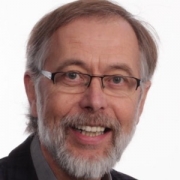In Memoriam Kees J. Laban, MD, PhD (1953-2018)
Being one of the world leading pioneers of transcultural psychiatry and advocate of the active role of the psychiatrist to defend the rights of the vulnerable patient, dr. Kees Laban has passed away on 17 October 2018, at the age of 65.
Cornelis J. Laban (Kees), M.D. Ph.D., born in the city of Rotterdam in the Netherlands on 17 September 1953, studied medicine in the city of Utrecht (1974-1981) where he developed an interest in psychiatry and the desire to become a tropical doctor in Africa. After a one-year study of cultural anthropology and medical sociology in Leiden, in 1983 he followed his adventurous nature for a five-year stay in Cross River State, Nigeria. In post-Biafra Nigeria, against his expectations of finding a lot of trauma-related problems, he discovered that only few of his patients were suffering from such problems. A nurse told him about the ‘law of the bamboo’: “When the wind blows strong you bow, and when she is quiet again you bend back”. Later he learned that the ability to bounce back after hardship and trauma is usually described as resilience, one of the main topics of his active career as a transcultural psychiatrist. He also repeatedly told about a special experience at that time with a chief who was dying and who said that if he had been a good chief, it would rain within three days after his passing. But it was dry season and no one, including Kees, believed that it was possible that it would rain. Two days passed without rain, but on the third day, suddenly it began to rain. These were two of the experiences that convinced Kees that a resilience approach and anthropological knowledge were indispensable, when he was asked to found a mental health unit for refugees in 2003 that he called De Evenaar (the equator) at GGZ Drenthe Mental Health Care.
De Evenaar, a center for transcultural psychiatry, became his central focus for fifteen years, leading the center that grew from ten to thirty employees with several disciplines, such as psychiatrists, psychotherapists, clinical psychologists, mental health psychologists, orthopedagogues, psychiatric nurses, occupational therapists, and one anthropologist. He added out-patient care, mental health care for refugee children and youth, and opened a new center in the province of Friesland. The number of patients grew to over 600. Specialized knowledge became to cover the northern part of the Netherlands. Collaboration was found with other transcultural psychiatric centers nationwide. Contributions to radio and television interviews made Kees Laban to become a nationally known figure as a psychiatrist with a humanitarian view on psychiatry and a great heart for refugees, asylum seekers and migrants. He was involved with the training program for psychiatry residents and lectured on several symposia.
As the Chair between 2008 and 2013, he developed the Section Transcultural Psychiatry of the Dutch Foundation of Psychiatry into a full-fledged Department and became member of the Transcultural Psychiatry Section of the World Psychiatric Association (WPA-TPS). He was a very active member and gained international fame as the organizer of the world conference of that section, together with prof. dr. Joop de Jong, in the city of Amsterdam in 2010. As an example of his versatility, in the same week, he obtained his Ph.D. at the Free University of Amsterdam. His groundbreaking publications on the impact of a long asylum procedure on the prevalence of psychiatric disorders in Iraqi asylum seekers in the Netherlands brought him fame and international recognition. The government of Denmark invited him to illuminate his research findings, one of the markers of his political engagement. He became Chair of the WPA-TPS in 2015 and organized an international conference in Hamburg in 2016, entitled “People on the move: Asylum seekers and Refugees. This conference resulted in a declaration, a call for a European humanitarian response to the mental health situation of refugees and asylum seekers. This declaration became accepted by the WPA, the Section of Cultural Psychiatry of the European Psychiatric Association, Intercultural Psychiatry and Psychotherapy, Migration of the Deutsche Gesellschaft für Psychiatrie und Psychotherapie, Psychosomatik und Nervenheilkunde, and the Turkish-German Association for Psychiatry, Psychotherapy, and Psychosocial Health. Kees Laban was at the forefront of humanitarian aid to forcefully displaced people due to wars, armed conflicts, persecutions, violence, and human rights violations.
He was also active as an editor of a special double edition of the journal Transcultural Psychiatry on refugees and asylum seekers. This edition was published in 2017, containing 15 articles, written by 44 authors. He published in several journals, such as the Journal of Nervous and Mental Disease, Social Psychiatry and Psychiatric Epidemiology, Transcultural Psychiatry. International conferences were a way for him to engage with many colleagues around the world, encourage colleagues to share symposia in cultural psychiatry conferences in cities such as Madrid, Nice, Cape Town, and Berlin. He was one of the organizers of a successful conference in Gdansk, Poland to engage colleagues from Middle and Eastern Europe, and Dutch-German conferences. Kees Laban was a tremendously inspiring and prominent connector improving collaboration between transcultural psychiatry institutes in the Netherlands and between WPA-TPS and the World Association for Cultural Psychiatry (WACP). In numerous radio, television, and newspaper interviews he successfully drew attention to the mental health situation of refugees in the Netherlands, who are often marginalized. With enormous effort and unwavering spirit he succeeded in improvement of a humane approach of medical and psychosocial policies nationwide and internationally.
In October 2017, he handed over Chairmanship of the WPA-TPS because of health problems, but he remained active as member of the Board. On 17 September 2018 he celebrated his 65th birthday with the entire team of De Evenaar, of which he was the founder and leader. He wanted to lecture on the advocacy of the psychiatrist at the World Conference of the WACP in October 2018, but unfortunately had to leave because of health problems. At this conference he was assigned a WPA-TPS Lifetime Achievement Award for Leadership, Research, and Education. Being in hospital, he received the message and replied in great happiness. His family received the plaque.
With Kees Laban, the international world of cultural psychiatry has lost a stimulating inspirator with great spirit, energy, kindness, a great heart for many, and a good friend. Many colleagues around the world have shared their grief and condolences.
By Simon Groen and Hans Rohlof

